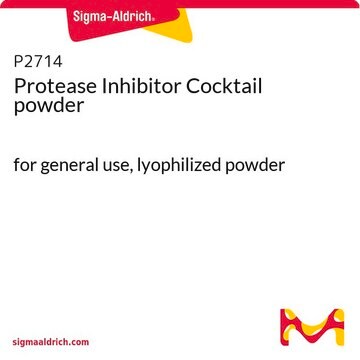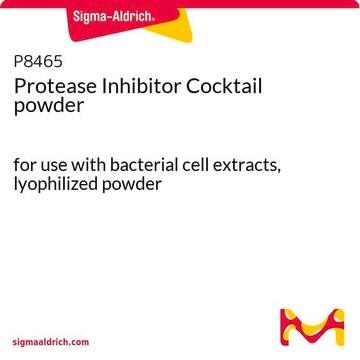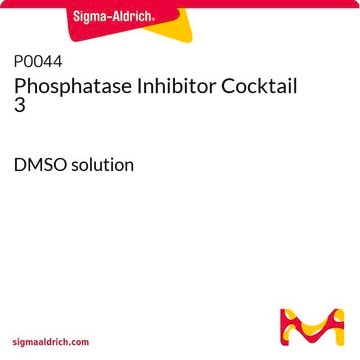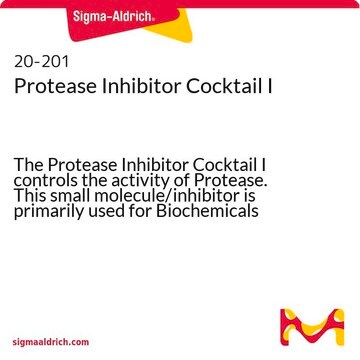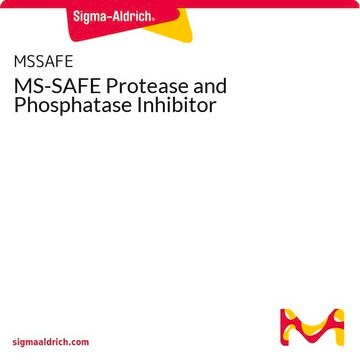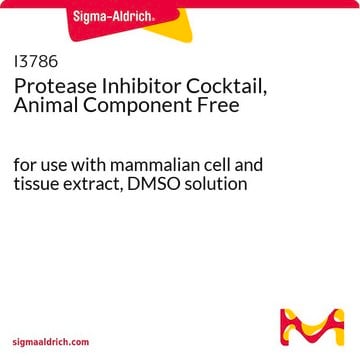This product can be used in rat tissue homogenate. It already contains serine and cysteine protease inhibitors. Note that PMSF has a short half-life in aqueous solutions, specifically 55 minutes at 25°C and pH 7.5.
P8340
Protease Inhibitor Cocktail
DMSO solution, for the inhibition of serine, cysteine, acid proteases and aminopeptidases, for use with mammalian cell and tissue extracts, DMSO solution
Synonym(s):
Protease Inhibitor Mix
About This Item
Recommended Products
Product Name
Protease Inhibitor Cocktail, for use with mammalian cell and tissue extracts, DMSO solution
biological source
bovine lung
Quality Level
form
DMSO solution
solubility
water: soluble
storage temp.
−20°C
Looking for similar products? Visit Product Comparison Guide
Related Categories
General description
Specificity
Application
Provides protection against endogenous enzyme activity in cell and tissue extracts
Biochem/physiol Actions
Features and Benefits
Stable storage: supplied as a solution in DMSO, allowing for long-term storage at -20°C
Consistent performance: ready-to-use solution
Components
Aprotinin
Bestatin
E-64
Leupeptin
Pepstatin A
Caution
Preparation Note
also commonly purchased with this product
related product
Signal Word
Warning
Hazard Statements
Precautionary Statements
Hazard Classifications
Eye Irrit. 2 - Skin Irrit. 2
Storage Class Code
10 - Combustible liquids
WGK
WGK 2
Flash Point(F)
188.6 °F - closed cup
Flash Point(C)
87 °C - closed cup
Choose from one of the most recent versions:
Certificates of Analysis (COA)
Don't see the Right Version?
If you require a particular version, you can look up a specific certificate by the Lot or Batch number.
Already Own This Product?
Find documentation for the products that you have recently purchased in the Document Library.
Customers Also Viewed
Related Content
Research evaluating immune checkpoints may help identify those likely to benefit from PD-1/PD-L1 immunotherapy and reveal new immunotherapy targets for future investigation. See how the MILLIPLEX® Human Immuno-Oncology Checkpoint Protein Panel 2 was used to multiplex immune checkpoint molecules for NSCLC research.
Select different protease inhibitor types based on your needs to prevent protein degradation during isolation and characterization and safeguard proteins in sample prep.
-
Can this product be used for IL-6 detection using ELISA in rat tissue Homogenate? Can it be used along with PMSF without creating any problem in the assay?
1 answer-
Helpful?
-
-
How long is the protease inhibitor cocktail stable at room temperature?
1 answer-
This product ships without wet or dry ice and is stable for up to two weeks at ambient temperatures. The long-term stability of this material at room temperature has not been determined. The recommended long-term storage temperature is -20°C.
Helpful?
-
-
Can we dilute it in water? The experiment I plan to do will require 100ul of Protease inhibitor per vial, and I have more than 50 samples to run.
1 answer-
This product is ready to use and should be diluted into the lysis buffer.
Helpful?
-
-
Is the protease cocktail P8340 supplied as a 100X solution or a 1X solution?
1 answer-
This cocktail is essentially a 100X preparation. One milliliter of this solution is sufficient for the inhibition of endogenous enzymes found in 100 mL of lysate. Please see the link below to review this and additional information available in the product datasheet:
https://www.sigmaaldrich.com/deepweb/assets/sigmaaldrich/product/documents/107/629/p8340dat-ms.pdfHelpful?
-
-
What is the stock concentration of the Protease Inhibitor Cocktail P8340? Is it 1x or 100x?
1 answer-
The concentration of inhibitors in this product is the following:AEBSF, 104 mMAprotinin, 0.085 mMBestatin, 4 mME-64, 1.4 mMLeupeptin, 2 mMPepstain A, 1.5 mM.
Helpful?
-
-
Do we need to add PMSF as well along with this cocktail? I intend to use this for RIPA buffer
1 answer-
PMSF is a serine protease inhibitor. You can certainly add along with the cocktail if needed.
Helpful?
-
-
What is the working concentration if adding to the blood?
1 answer-
The recommended amount to use is 1:100 (v:v) directly to the whole blood, but one has to take into consideration that this will disrupt the coagulation cascade. If it is a concern, the protease inhibitor cocktail should be added after separation of the blood components. In the serum use at the same concentration as for blood, 1:100 (v:v)
There are articles citing this product when using blood samples. 1-100 was used in both articles:
https://www.ncbi.nlm.nih.gov/pmc/articles/PMC7346264/
https://www.ncbi.nlm.nih.gov/pmc/articles/PMC2722770/Helpful?
-
-
How long can this product be stored at -20C?
1 answer-
This product is not assigned an expiration date. It is assigned a recommended retest date of approximately 4 years after the quality release date. A recommended retest date is the period of time during which the product is expected to remain within established stability specifications, provided that it has been stored under defined conditions. The retest date can be found in the lot specific Certificate of Analysis. After the Retest Date, product samples should be examined to ensure that the product is still in compliance with the established specifications. For more information, you may access the "Product Dating Information" document under "ADDITIONAL USEFUL DOCUMENTS ABOUT OUR PRODUCTS" at the bottom of the Quality Services page with this link: https://www.sigmaaldrich.com/US/en/life-science/quality-and-regulatory-management/quality-services.
Please see the link below to review a sample Certificate of Analysis:
https://www.sigmaaldrich.com/certificates/sapfs/PROD/sap/certificate_pdfs/COFA/Q14/P8340-1ML0000227406.pdfHelpful?
-
-
Does Product P8340, Protease Inhibitor Cocktail, contain any chelators or EDTA?
1 answer-
This product does not contain any metal chelators.
Helpful?
-
-
Is there anything in Product P8340, Protease Inhibitor Cocktail, that will cause downstream problems with RT-PCR?
1 answer-
While the product should not cause any downstream problems with RT-PCR, we would advise to clean up the reaction with either DMN10 (GenElute™ Direct mRNA Miniprep Kit) or T9424 (TRI Reagent®) for purification.
Helpful?
-
Active Filters
Our team of scientists has experience in all areas of research including Life Science, Material Science, Chemical Synthesis, Chromatography, Analytical and many others.
Contact Technical Service